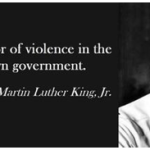What Would King Say About Iraq War

President Bush seems determined to implement his new doctrine of pre-emptive war, this time against Iraq (next time, who?). What would Martin Luther King Jr. say?
Although King did not completely rule out the right to self-defense, it is almost certain that he would not define bombing and invading other countries as self-defense. Rather, he would warn us, as he did in his life, about the evils of war and its futility as a way of resolving conflict.
King said war inevitably wreaks havoc on civilians, accelerates violence and obscures its causes by demonizing people as enemies in order to justify killing them. His perceptive analysis of the Vietnam War shredded the fallacy that war brings peace. Government leaders put half a million American troops in Vietnam, terrorized the populace by dropping more bombs on a country the size of Florida than all the bombs dropped during World War II and called propping up dictators a war for freedom. They justified it all in the name of fighting communism, ignoring the cost of killing more than 2 million Vietnamese, countless other Cambodians and Laotians and some 60,000 American soldiers.
King did not think it surprising that dispossessed people in countries subjected to neo-colonial rule reacted to their impoverished conditions with bombs and suicide attacks. Defining them merely as enemies and using violence to destroy them, he said, made it impossible to ameliorate the conditions that breed violence. "Someone must have sense enough and morality enough to cut off the chain of hate," he said, but apparently that someone today is not the U.S. government.
The compassionate and self-critical scrutiny that King called for seems to be furthest from the minds of the Bush administration. King worried that such leaders "possess power without compassion, might without morality and strength without sight," and so should we today.
Defense Secretary Donald Rumsfeld may be counting on a "cakewalk" (his words) of a war, hoping that massive firepower against a vulnerable, decimated country will minimize U.S. casualties. An easy defeat of the Iraqi Army would not dispel King's moral objections, however. The United Nations has predicted a humanitarian disaster and Arab ministers have warned that U.S. war would "open the gates of hell" throughout the Mideast, precipitating more terrorism and violence.
King said during the Vietnam War that "Americans are forcing even their friends into becoming their enemies," and "in the process they are incurring deep psychological and political defeat." We seem to be doing much the same thing today.
King also warned that militarism fosters a pervasive atmosphere of violence at home. As we confront gang wars, school shootings and other senseless violence in our society today, how can we not be concerned about the massive, state-sponsored violence modeled by our own government, as it and American companies become arms merchants to the world?
And, as King warned in 1968, military power exhausts resources needed to create jobs, health care, housing, education and economic infrastructure. As millions of Americans stand in food lines and as AIDS and hunger proliferate across the globe, can't we imagine better ways to make and use money?
As America plays both world arms merchant and policeman, the quest for military control, as King put it, has placed us "on the side of the wealthy and the secure while we create a hell for the poor." It seems we truly are becoming a country where, as King warned, "machines and computers, profit motives and property rights are considered more important than people."
There is an alternative. Pursuing peace, economic redistribution and racial, ethnic and international fairness, King thought, could combat militarism, materialism and racism; it could insure that "the pursuit of peace will take precedence over the pursuit of war." We could become, as historian Howard Zinn says, "a humanitarian superpower" rather than a military juggernaut.
Why not try it? We ignore at our own great peril King's demand for reordering our priorities so that we live up to our moral ideals.
[Michael Honey is a labor and freedom movement historian. His most recent book is To the Promised Land: Martin Luther King and the Fight for Economic Justice. He is emeritus professor of humanities at the University of Washington Tacoma.]
Thanks to the author for sending this to Portside.
